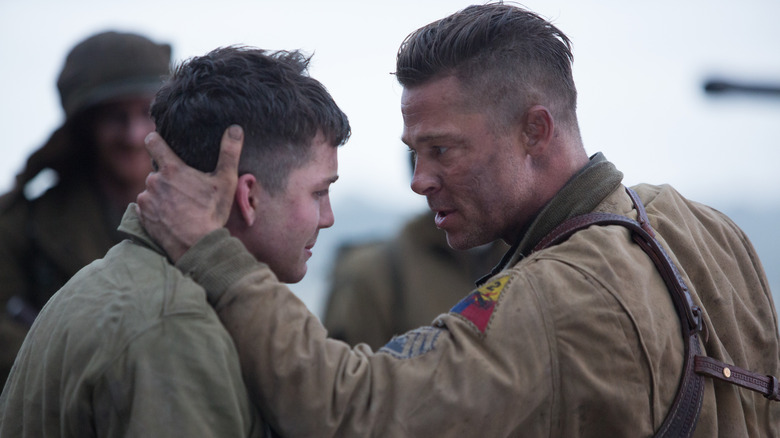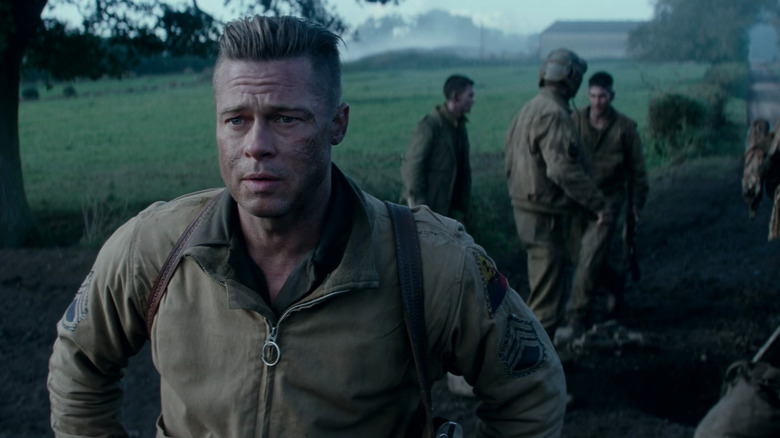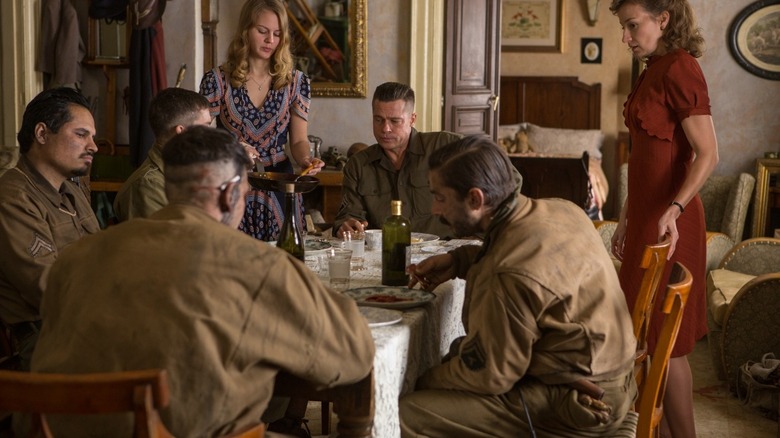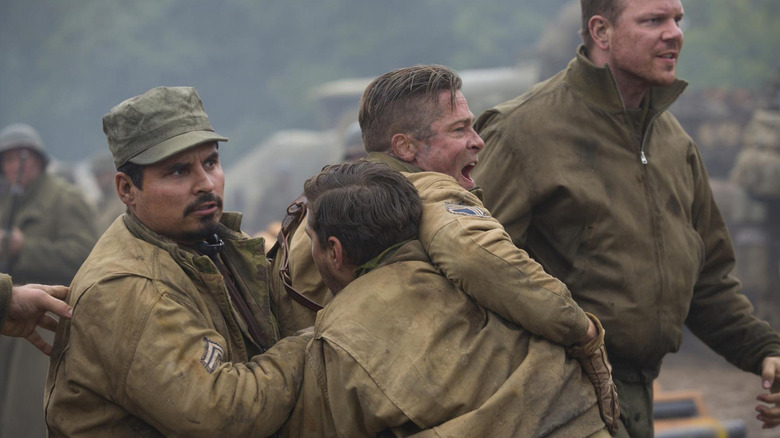David Ayer Broke Brad Pitt Down To Prepare Him For Fury
Early in David Ayer's 2014 war film "Fury," the dead body of an American soldier is seen face-down on a muddy battlefield, the poor soul obliterated by a vicious battle that had taken place earlier in the day. One can make out the vague shape of a human being, but it's largely just blood and pulp at this point. Other soldiers mill around nonchalantly, coldly accustomed to the sight of fallen comrades. Brad Pitt, as Staff Sergeant Don "Wardaddy" Collier, orders the men under his command to climb on board the titular Sherman tank and move out to the next battle. The tank rolls over the dead body in the mud, mashing it beyond recognition. As the tank rolls away, the human body is more or less gone. What was once a person is now just a sludgy mixture of mud and blood; humanity swallowed up by muck.
The vanishing soldier's body is a symbol of the general attitude of "Fury," a brutal, sad, nihilistic film about the horrors of WWII. Over the course of "Fury," audiences witness several characters losing their souls to the violence, each one becoming far too accustomed to death. Humanity will fall, swallowed by the muck of violence. Collier attempts to frame his wartime coldness as a form of machismo, but there is no machismo here. There is just destruction.
As one might be able to glean from the screen, preparing for "Fury" was a harrowing experience unto itself, and Brad Pitt — in a 2014 interview with IndieWire, which also included Ayer – compared the rehearsal process to getting a root canal. There was research, and there was a specially designed boot camp intended to make the actors cold, hungry, and desperate in real life.
Boot camp is no gimmick
The training process for "Fury," according to Pitt, involved multiple conversations with actual veterans, becoming intimately familiar with the tank, and even getting into brawls with his co-stars. The relationships between the soldiers in "Fury" are utterly antagonistic, and while they're careful to work together to accomplish any kind of attack mission, they also keep their camaraderie at a low ebb; the film is far too dirty and depressive to allow for any kind of genuine inter-platoon warmth. The first three months of production — a long span for any movie — were taken up by training, fighting, and an actual boot camp. Pitt described the boot camp thusly:
"[B]oot camp sounds like a gimmick for actors, but we had some of the SEALs' best design this for us. And it was really an amazing experience the way it was structured to break us down, to make us understand hardship, make us be cold, wet, hungry, physically exhausted and then gave us tasks that would bring us together, bond us, discover each other's weaknesses and strengths and establish a pecking order. It was really a profound experience."
Profound, perhaps, but horrible. The actors were only able to bond over shared misery, perhaps authentic to the way soldiers have to bond on the battlefield. When pushed so close to death, with one's resolve already broken, clinging to one another out of bleak, violent need can perhaps feel like camaraderie.
And that wasn't the end of it. In fact, Ayer, in addition to pushing them to their physical limits, was also careful to get into his actors' heads as well.
The dinner
In the IndieWire interview, Ayer pointed out that, as a director, he believes in authenticity. Indeed, he seems to have little trust in traditional acting methods, preferring to wring genuine pain out of his "Fury" cast. Pushing the cast to their extremes was all about getting under their skin, making them actually feel the desperation, the rage, the fury of American military men of the 1940s. He described his ethos and even some of his more insidious techniques. He didn't want actors to fall back on their known tools but wanted them to have to develop tools on the fly. "I'm a big believer in the lizard brain and human physiology," he said. "Make it as real as possible. You can't act real behavior. They have this incredible craft and skill. I want to help them by getting the adrenaline, stress, and excitement going — and sometimes I undermine them and confuse them."
Confuse them? It turns out that Ayer once orchestrated what was essentially the worst possible Thanksgiving imaginable. During "Fury," the soldiers gather around a dinner table — a brief moment of respite — only to seethe. Ayer admits that he deliberately violated some actors' trust in order to get them genuinely enraged at one another. He would have intimate one-on-one conversations with Pitt, and then weaponized what he had learned. Ayer said:
"That was really my worst offense as a director. These guys really trusted me with their secrets and we worked so hard to build this trust and this relationship and bond between the actors that would then inform their on-screen chemistry. And I used all that information against them. I'd slip Brad's secrets to the other guys. It was a dirty knife fight in an alley. But, you feel the tension, you see it on screen."
The stench of four men
Was it all worth it? Some critics certainly responded positively to "Fury," as it currently holds a 76% approval rating on Rotten Tomatoes. Its triumphs lie in its dour nihilism. The film is ostensibly about men bonding through the extremities of war, but that bonding is poisoned by the violence that caused it. These men may be willing to die for one another, but "Fury" argues they're definitely going to die. Either at the hand of the enemy or by the darkness that will forever live in their minds.
Regardless, Pitt says that working on "Fury" was ultimately a very positive experience and that he learned to tolerate more than he imagined. Pitt said, affably, "I'm more tolerant to the stench of another man — particularly four other men. But, I love these boys and I love [Ayer]. I'm a better father because of what we went through."
Pitt does not elucidate further on how "Fury" made him a better father, but if endurance and patience were part of the lesson, then any parent can understand. If he only meant that he was able to tolerate a new variety of human stenches ... well, then many parents can understand that, too. Pitt is the father of six children, so endurance and patience are likely a must.



